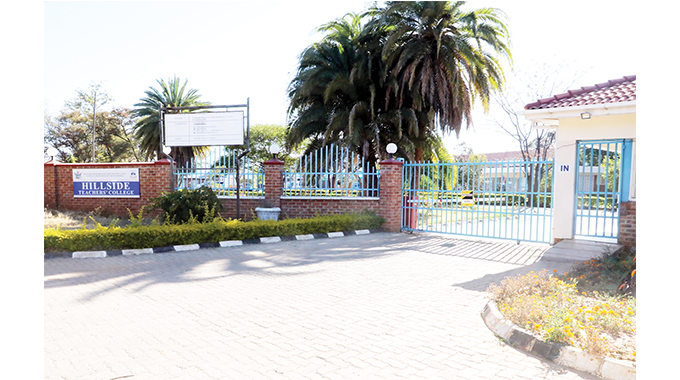The Chronicle

Nqobile Tshili, Chronicle Reporter
SOME schools in Bulawayo are set to introduce Chinese language, expanding their learning areas as the country’s education system adopts more foreign languages in a bid to create globally competitive citizens.
Montrose High School and Nkulumane High School are finalising the introduction of Mandarin at the learning institutions to arguably become the first government schools to teach the language.
The teaching of Mandarin is expected to start at the beginning of next year at the Bulawayo schools.
Since the turn of the millennium, Zimbabwe has increased trade and deepened bilateral relations with China and an increasing number of Zimbabwean students studying in the Asian giant.
Some Chinese nationals have established companies in Zimbabwe, with China involved in major infrastructure projects in the country such as the construction of Lake Gwayi Shangani and the new parliament of Zimbabwe building as well as the upgrading and rehabilitation of Hwange Unit 7 and 8 power stations.
The execution of these national projects has also led to transfer of knowledge between Zimbabweans and Chinese experts working on the projects.
In Bulawayo, Hillside Teachers College is already teaching Mandarin.
Speaking during a Hillside Teachers’ College graduation ceremony two weeks ago, the college’s principal Mrs Linda Sibindi said the college was working with Nkulumane High School and Montrose High School to introduce the Chinese language.
 Hillside Teachers’ College
Hillside Teachers’ CollegeA school head in one of the schools, who cannot be named as she was not cleared to talk to the press said they were also working with the University of Zimbabwe towards introducing Mandarin.
“We expect the technical team to be here by the end of the month. But the plan is that we start teaching the language starting next year,” said the head.
Primary and Secondary Education Ministry’s director of communication and advocacy Mr Taungana Ndoro said several schools in the country have adopted the teaching of the Chinese language as part of the four foreign languages being taught in the country.
“Proper language learning means learning of the four basic skills which are listening, speaking, reading and writing. Language in the Zimbabwe curriculum comprises 14 indigenous languages, English, Sign and Foreign languages: Chinese, Portuguese, Swahili and French.”
Mr Ndoro said while English is taught from infant levels, French is taught from Grade Three classes while Portuguese, Chinese and Swahili are at secondary level.
Primary and Secondary Education Permanent Secretary Mrs Tumisang Thabela said the teaching of Mandarin is more pronounced at private schools at the moment.
She said those who learn foreign languages are likely to get more opportunities in the global village where nations trade more.
Mrs Thabela said Government is training pupils that can compete on a global stage.
“Currently I can say it’s mainly private actors who can afford to pay extra teachers to give them foreign languages. In the public system we still do not have much of that,” said Mrs Thabela.
“Today’s child has to be given skills to live anywhere and thrive anywhere. The Chinese economy is one of the strongest currently. So, Mandarin comes in because trade is now much alive to goods and products. Most of our goods in our houses have a lot of Chinese that we cannot read and they have a lot of wrong translations,” said Mrs Thabela.
“So, for those children who are looking beyond Zimbabwe, beyond their boundary Mandarin becomes one of the options. Definitely it will give them an edge.”
Lupane State University (LSU) senior lecturer in the Languages Department Dr Busani Maseko said the teaching of Chinese language is an acknowledgement of the global influence of China.
 Lupane-State-University
Lupane-State-UniversityHe said going forward, Chinese Mandarin will be a language of opportunity.
“It’s not just the spread of the Chinese language but the spread of the influence of its speakers. The Chinese influence is increasing not just in Zimbabwe but in Africa in general, South America among other continents. China is fast becoming a global power house and its language is spreading just like How the English language spread,” he said.
“English language spread not because it was a powerful language but because it was spoken by the globally powerful economies, for example the United States of America and the United Kingdom.”
Dr Maseko said China is already upstaging the US economy in terms of its gross domestic product which means that more nations will trade with it hence the need to learn Chinese language for enhanced communication in doing business.
He said the Chinese language will be more relevant in Zimbabwe considering the increasing trade relations between the two friendly nations.
“As you might be aware, some of the big projects in Zimbabwe are done by the Chinese. So, the local population has to be able to communicate with the Chinese,” he said.
Dr Maseko said learning Mandarin will have a competitive advantage for job seekers.
“Our local people who would have acquired Chinese can have increased employment opportunities in the country when they also take up Chinese teaching posts,” said Dr Maseko.
He however warned that while adoption of Mandarin was a welcome development, there is a need to strengthen the learning of indigenous languages, which have not gained traction despite being introduced in schools.
A language expert who also teaches Chinese language at one of the country’s universities who could not be named as they were not cleared to speak to the press said the teaching of Chinese language is mutually beneficial to both nations.
“The increase in trade and bilateral relations is not one-sided but mutually beneficial for both countries. We have our citizens who are going to study in China and the Chinese here who have established companies are creating job opportunities. They have also started to appreciate our culture,” said the expert.
She said the Ministry of Primary and Secondary Education should consider revising the stages of introducing the language in schools.
She said as opposed to introducing the language at secondary level, learners need to learn it at infant level and this will relieve pressure from universities from teaching the language basics at tertiary level. — @nqotshil
Article Source: The Chronicle
